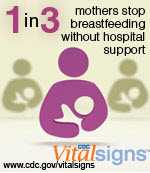Progress in Increasing Breastfeeding and Reducing Racial/Ethnic Differences — United States, 2000-2008 Births
MMWR Article
For more see full text
MMWR Highlights

Among infants born in 2008, 74.6% began breastfeeding, 44.4% breastfed for 6 months, and 23.4% for 12 months. Yet, there are racial and ethnic differences in breastfeeding initiation (starting) and duration (continuing) rates.
More Women Are Breastfeeding and for Longer Periods
- From 2000–2008, the percentage of women who initiated breastfeeding went up from 47.4% to 58.9% for blacks, and 71.8% to 75.2% for whites. Initiation rates for Hispanics went from 77.6% to 80.0%, although this was not a significant increase.
- Infants that were breastfed at 6 and 12 months increased greatly among all three racial/ethnic groups.
- While 74.6% of infants born in 2008 began breastfeeding, only 23.4% met the recommended breastfeeding duration of 12 months. This indicates women may need more support to continue breastfeeding.
Breastfeeding Among Black Women
-

The gap between black and white breastfeeding initiation rates narrowed from 24 percentage points in 2000 to 16 percentage points in 2008. The 6-month duration gap also narrowed from 21 percentage points to 17 percentage points during that same time.
- Black infants consistently had the lowest rates of breastfeeding initiation and duration across all study years. Black mothers may need more, targeted support to start and continue breastfeeding.
Learn more about how to support breastfeeding women in various settings at the CDC’s Breastfeeding Web site.
MMWR News Synopsis for February 7, 2013

These broadcast quality clips feature CDC Director Tom Frieden, M.D., M.P.H. speaking about the MMWR article on Progress in Increasing Breastfeeding and Reducing Racial/Ethnic Differences — United States, 2000 and 2008 Births.
Breastfeeding
Related Links
HHS
- The Surgeon General’s Call to Action to Support Breastfeeding outlines a number of action steps that communities, employers, health care providers, governments and nonprofit organizations can take to better support breastfeeding.

CDC
- The CDC Guide to Strategies to Support Breastfeeding Mothers and Babies offers recommendations and program examples to assist states, territories and communities to better support mothers to start and continue breastfeeding.
External Links
- Best Fed Beginnings helps 89 hospitals to better support breastfeeding and move hospitals toward Baby-Friendly designation.
- The Baby-Friendly Hospital Initiative is a collaboration of UNICEF and the World Health Organization promoting 10 evidence-based steps that hospitals should use to support breastfeeding.
- Page last reviewed: February 7, 2013
- Page last updated: April 30, 2016
- Content source:


 ShareCompartir
ShareCompartir